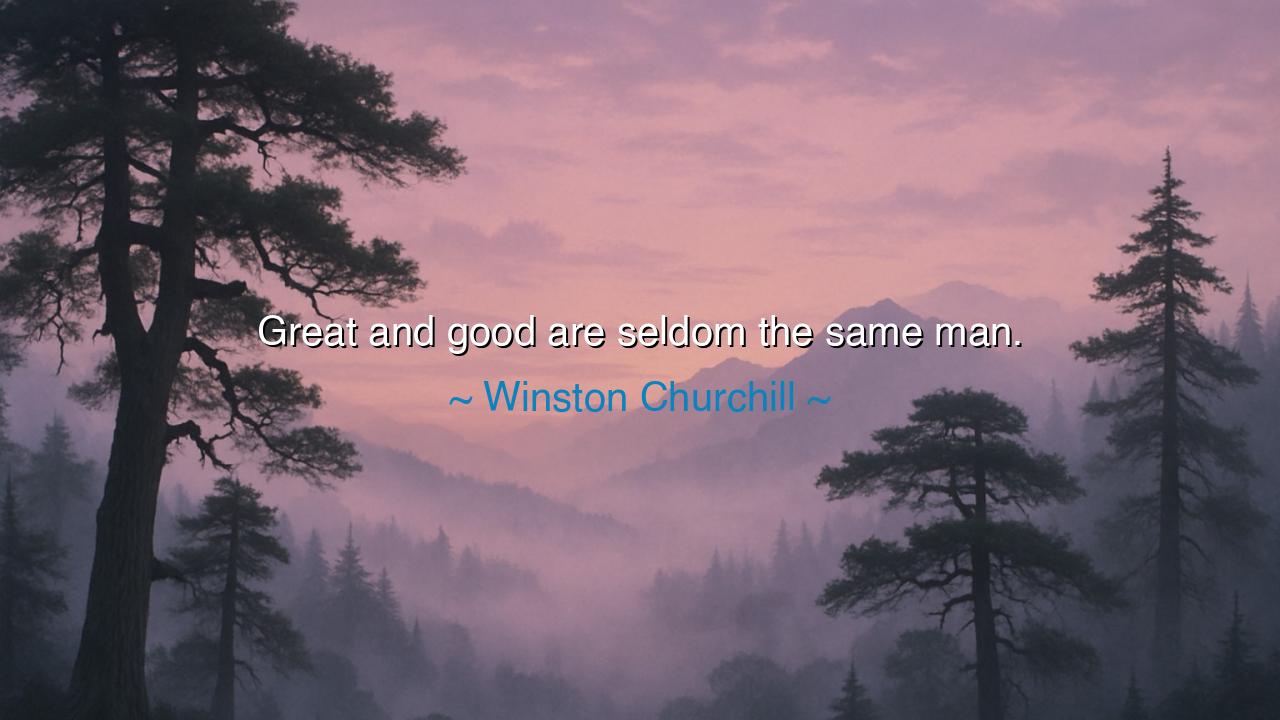
Great and good are seldom the same man.






"Great and good are seldom the same man." — Winston Churchill
Thus spoke Winston Churchill, a man who had walked among both triumph and tragedy, and who knew the double edge of greatness better than most. In this short, solemn saying lies a truth older than empires — that the qualities that make a man great in power, ambition, and renown are not always the same as those that make him good in heart, virtue, and compassion. The world often crowns its conquerors and admires their brilliance, yet forgets that the light of greatness can cast a long and terrible shadow.
Churchill, who himself carried the weight of nations upon his shoulders, spoke from a lifetime of war and politics, where greatness demanded ruthlessness, and mercy could sometimes mean defeat. He had seen how men of vision — bold, unyielding, consumed by purpose — could change the world, but also wound it. He had seen Napoleon, who rose from nothing to command the earth, yet left behind fields of death. He had seen Hitler, who sought greatness through domination, and proved that power without goodness becomes destruction. Churchill’s words are not of cynicism, but of warning: that ambition, untempered by virtue, turns glory into ruin.
From the dawn of history, this truth has repeated itself. The pharaohs of Egypt built pyramids that touched the heavens, yet the hands that raised them were those of slaves. Alexander the Great conquered the known world, but in his pursuit of glory, he burned cities, crushed nations, and died unsatisfied at thirty-three. Caesar brought order to Rome, but the price was liberty itself. These men were great, but not all were good. Their names thunder across the centuries, but their hearts left behind echoes of sorrow. Greatness, it seems, demands the iron of will — yet goodness requires the tenderness of the soul — and seldom can both dwell fully within one man.
Yet there have been rare and shining exceptions — those in whom power and virtue walked hand in hand. Abraham Lincoln, who bore the torment of a divided nation with the compassion of a father. Marcus Aurelius, emperor and philosopher, who ruled with justice and wrote of humility. These men remind us that goodness need not be weakness, and that true greatness — the kind that endures — is forged not from conquest, but from conscience. They show us that the measure of a man lies not in the reach of his power, but in the mercy with which he uses it.
Churchill’s words, however, are not meant to despair of mankind. They remind us that greatness without goodness is hollow, and that the pursuit of virtue is itself a form of power. The world will always need its strong — the builders, the leaders, the daring few who stand when others fall — but it will perish if their strength is not guided by goodness. The greatest danger to humanity has never been weakness, but greatness divorced from moral restraint.
Therefore, my child, if fate ever places power in your hands — be it over a nation, a family, or a single heart — remember this saying. Seek to be good before great. Let your strength serve justice, and your ambition serve others. Do not confuse might with worth, nor fame with honor. The world remembers the conqueror’s victories, but it reveres the good man’s peace. Greatness can command armies, but only goodness can heal them.
So let this be your creed: strive for greatness of spirit, not merely greatness of name. Build, but build kindly; lead, but lead humbly. For history is filled with the ashes of men who were great — and only a few whose greatness was sanctified by goodness. The former are feared; the latter, eternal. And so Churchill’s truth stands across the ages: “Great and good are seldom the same man” — yet the highest calling of the soul is to become one who is both.






AAdministratorAdministrator
Welcome, honored guests. Please leave a comment, we will respond soon